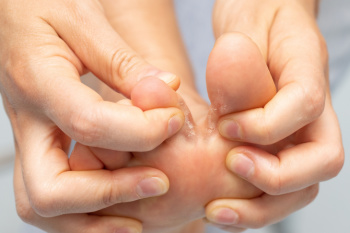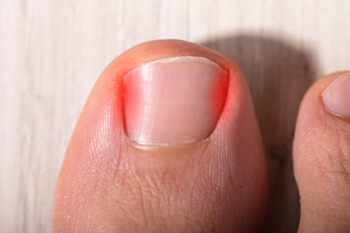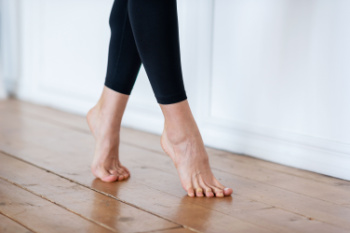
Athlete’s foot is a common fungal infection that causes discomfort and irritation, typically between the toes. This condition is caused by fungi called dermatophytes, which thrive in warm, moist environments like sweaty shoes and socks. If you have athlete's foot, you may experience intense itching, redness, peeling, and in some cases, blisters or cracks. The feeling can be persistent and frustrating, making it difficult to wear shoes or walk comfortably. There are different types of athlete’s foot. Interdigital athlete's foot affects the space between the toes, while the moccasin type causes dry, scaly patches on the soles and sides of the feet. The infection can easily recur if not treated properly, as the fungi can survive on surfaces like towels, shoes, or floors. Poor hygiene and tight shoes can also contribute. If you are dealing with recurring athlete’s foot, it is suggested that you make an appointment with a podiatrist who can provide effective treatments, including prescribed antifungal medications.
Athlete’s foot is an inconvenient condition that can be easily reduced with the proper treatment. If you have any concerns about your feet and ankles, contact Mark Poplawski, DPM from Jersey Shore Podiatry, LLC. Our doctor will treat your foot and ankle needs.
Athlete’s Foot: The Sole Story
Athlete's foot, also known as tinea pedis, can be an extremely contagious foot infection. It is commonly contracted in public changing areas and bathrooms, dormitory style living quarters, around locker rooms and public swimming pools, or anywhere your feet often come into contact with other people.
Solutions to Combat Athlete’s Foot
- Hydrate your feet by using lotion
- Exfoliate
- Buff off nails
- Use of anti-fungal products
- Examine your feet and visit your doctor if any suspicious blisters or cuts develop
Athlete’s foot can cause many irritating symptoms such as dry and flaking skin, itching, and redness. Some more severe symptoms can include bleeding and cracked skin, intense itching and burning, and even pain when walking. In the worst cases, Athlete’s foot can cause blistering as well. Speak to your podiatrist for a better understanding of the different causes of Athlete’s foot, as well as help in determining which treatment options are best for you.
If you have any questions please feel free to contact our office located in Toms River, NJ . We offer the newest diagnostic and treatment technologies for all your foot and ankle needs.

An ingrown toenail may seem like a minor issue at first, but it can quickly lead to significant discomfort and infection. This condition occurs when the edge of a toenail grows into the surrounding skin, often causing redness, swelling, and pain. Wearing tight footwear, improper nail trimming, and even genetics can increase the likelihood of developing an ingrown nail. Left untreated, the area can become infected, making walking difficult and daily activities uncomfortable. While home remedies may offer temporary relief, they often do not address the underlying problem. A podiatrist can provide effective treatment, which may include lifting the nail, removing part of it, or offering guidance on prevention. Early intervention can prevent complications, especially for those with diabetes or circulation issues. If you notice persistent pain, swelling, or signs of infection in your toe, it is suggested that you see a podiatrist for a proper diagnosis and treatment.
Ingrown toenails may initially present themselves as a minor discomfort, but they may progress into an infection in the skin without proper treatment. For more information about ingrown toenails, contact Mark Poplawski, DPM of Jersey Shore Podiatry, LLC. Our doctor can provide the care you need to keep you pain-free and on your feet.
Ingrown Toenails
Ingrown toenails are caused when the corner or side of a toenail grows into the soft flesh surrounding it. They often result in redness, swelling, pain, and in some cases, infection. This condition typically affects the big toe and may recur if it is not treated properly.
Causes
- Improper toenail trimming
- Genetics
- Improper shoe fitting
- Injury from pedicures or nail picking
- Abnormal gait
- Poor hygiene
You are more likely to develop an ingrown toenail if you are obese, have diabetes, arthritis, or have any fungal infection in your nails. Additionally, people who have foot or toe deformities are at a higher risk of developing an ingrown toenail.
Symptoms
Some symptoms of ingrown toenails are redness, swelling, and pain. In rare cases, there may be a yellowish drainage coming from the nail.
Treatment
Ignoring an ingrown toenail can have serious complications. Infections of the nail border can progress to a deeper soft-tissue infection, which can then turn into a bone infection. You should always speak with your podiatrist if you suspect you have an ingrown toenail, especially if you have diabetes or poor circulation.
If you have any questions, please feel free to contact our office located in Toms River, NJ . We offer the newest diagnostic and treatment technologies for all your foot care needs.

Foot exercises play an essential role in maintaining mobility, strength, and flexibility. Strong and flexible feet improve shock absorption, reducing the impact on joints during activities such as walking and running. Proper weight distribution is also supported by well-conditioned feet, helping to prevent imbalances that can lead to discomfort or injury. Engaging in targeted exercises activates key muscles in the feet, promoting stability and endurance. Stretching and strengthening routines enhance movement efficiency and reduce the risk of conditions like plantar fasciitis and arch pain. Additionally, regular foot exercises can improve overall posture and balance, making daily activities and athletic performance more effective. If your feet are unstable and have become painful, it is suggested that you visit a podiatrist who can treat various foot conditions, and guide you on specific foot exercises for strength and flexibility.
Exercising your feet regularly with the proper foot wear is a great way to prevent injuries and build strength. If you have any concerns about your feet, contact Mark Poplawski, DPM from Jersey Shore Podiatry, LLC. Our doctor can provide the care you need to keep you pain-free and on your feet.
Exercise for Your Feet
Exercise for your feet can help you gain strength, mobility and flexibility in your feet. They say that strengthening your feet can be just as rewarding as strengthening another part of the body. Your feet are very important, and we often forget about them in our daily tasks. But it is because of our feet that are we able to get going and do what we need to. For those of us fortunate enough to not have any foot problems, it is an important gesture to take care of them to ensure good health in the long run.
Some foot health exercises can include ankle pumps, tip-toeing, toe rises, lifting off the floor doing reps and sets, and flexing the toes. It is best to speak with Our doctor to determine an appropriate regimen for your needs. Everyone’s needs and bodies are different, and the activities required to maintain strength in the feet vary from individual to individual.
Once you get into a routine of doing regular exercise, you may notice a difference in your feet and how strong they may become.
If you have any questions please feel free to contact our office located in Toms River, NJ . We offer the newest diagnostic and treatment technologies for all your foot and ankle needs.





